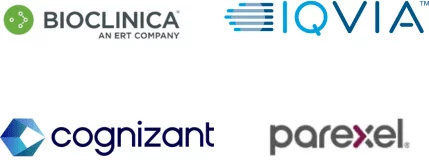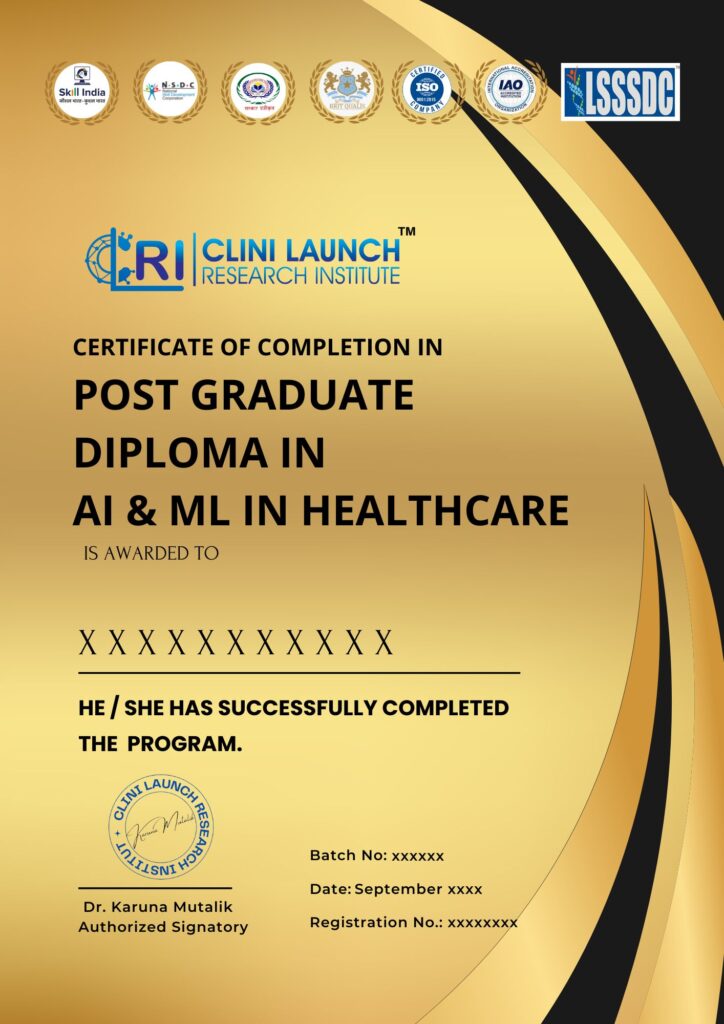AI ML Healthcare in Chennai
- 100% Placement Assistance
- Hands-on Practical Training
- Industry-Relevant Curriculum
- Globally Recognized Certification
This meticulously designed postgraduate diploma in AI ML healthcare in Chennai offers an in-depth exploration of how artificial intelligence and machine learning are transforming the medical landscape. Building upon your existing foundational knowledge, this program acts as a powerful catalyst for your professional growth, positioning you as a highly competent AI specialist within the healthcare industry.
Book Your Free Demo Class Today!
AI ML Healthcare in Chennai
- 100% Placement Assistance
- Hands-on Practical Training
- Industry-Relevant Curriculum
- Globally Recognized Certification
This meticulously designed postgraduate diploma in AI ML healthcare in Chennai offers an in-depth exploration of how artificial intelligence and machine learning are transforming the medical landscape. Building upon your existing foundational knowledge, this program acts as a powerful catalyst for your professional growth, positioning you as a highly competent AI specialist within the healthcare industry.
Book Your Free Demo Class Today!

IAO & IAF Accredited Course

LSSSDC Membership

Practical Industry Exposure

Industry-led Expert Trainers
Why pursue AI in medical field courses?
Equipping medical and healthcare professionals with the essential knowledge and abilities to effectively utilize AI technologies is crucial in today’s evolving sector. This AI ML Healthcare in Chennai is specifically tailored for individuals aiming to enhance operational efficiency within healthcare settings. It will provide you with the necessary tools to assess, comprehend, and implement AI technology effectively in the healthcare domain.
Globally Accredited Courses
100% Placement Assistance
Highly Qualified Trainers
Job Oriented Programs
Our Courses

AI Healthcare Course - PG Diploma in AI and ML in Healthcare
Accelerate your career in healthcare with CliniLaunch’s Post Graduate Diploma in AI and ML in Healthcare domain. Learn from industry led expert training, live-online sessions, and study materials with data-driven insights. This comprehensive program bridges the gap between academia and industry demand, empowering students to become a leading professional of AI & ML.
Why Medical Artificial Intelligence Course?
Industry Driven Curriculum
● Gain in-depth Knowledge
● Up-to-date Information
● Job-ready Skills
Experienced Instructors
● Seasoned Professionals
● Insightful healthcare practices
● Dedicated expert mentorship
Learning Experience
● Live Interactive Sessions
● Integrated case studies
● Practical step guidance
Globally Recognized Programs
● International Accreditation Organization
● International Accreditation forum
● National Skill Development Council
Career Support Services
● Placement Mentorship Programs
● Industry/Corporate Connects
● Live Webinars
What Sets CliniLaunch Apart

Placement Assistance
Strong network of recruiters from the healthcare, pharmaceutical, and biotechnology industries and offer placement assistance to students.
Industry Expert Trainers
Equip yourself with skills and knowledge under the mentorship of experienced faculties with over 17 years of experience in the field of healthcare research and training.
Learning Management System
Embark on a transformative learning experience with our state-of-the-art Learning Management System!
Non-Technical and Technical Sessions
Go beyond the textbook with a well-rounded foundation balancing essential technical and non-technical skills needed to thrive in healthcare, IT and Pharma.
Job Oriented Programs
Get comprehensive job-oriented programs to empower you with the skills and knowledge you need to succeed in the dynamic and competitive healthcare sector.
Benefits of Pursuing AI and ML in healthcare
Elevate your career prospects with Clini Launch’s Postgraduate Diploma in AI ML in Healthcare in Chennai, featuring an industry-focused curriculum, practical training, and dedicated placement support. Benefit from a robust professional network and collaborations with prominent organizations, guaranteeing hands-on experience and diverse career pathways within Chennai‘s AI ML healthcare sector. This program empowers you to realize your full potential and flourish in the dynamic healthcare landscape.
Eligibility Criteria


Learn from the best AI in Healthcare Online Course.
AI for Healthcare Course
AI for Healthcare Course -Curriculum Designed by Experts
PG Diploma in AI ML Healthcare in Chennai
- Fundamentals of Artificial Intelligence and Machine Learning
- Healthcare Applications of AI and ML
- Data Analysis Techniques in Healthcare
- Model Development and Optimization
- Ethical and Regulatory Considerations in AI and ML
- Real-world Case Studies in Healthcare
- Interdisciplinary Collaboration and Teamwork
- Hands-on Projects and Practical Applications
- Industry Trends and Emerging Technologies
- Capstone Project: Application of AI and ML in Healthcare
FREE Career Counselling
We are happy to help you 24/7
A Student’s Journey



Industry-Ready Training
Equip yourself with skills and knowledge required to be successful in the healthcare-pharma or healthcare-IT industry. Enhance your communication and personality.
Certified Courses
Earn credentials through online or in-person programs validating the enhancement of your skills and expertise in the healthcare-IT and pharma sector.
Get Placed
Gain access to volunteer, internship, and placement opportunities and apply real-world applications in healthcare settings like hospitals, CROs, and pharma companies.
What Sets CliniLaunch Apart?
Placement Assistance
Strong network of recruiters from the healthcare, pharmaceutical, and biotechnology industries and offer placement assistance to students.
Industry Expert Trainers
Equip yourself with skills and knowledge under the mentorship of experienced faculties with over 17 years of experience in the field of healthcare research and training.
Learning Management System
Embark on a transformative learning experience with our state-of-the-art Learning Management System!
Non-Technical and Technical Sessions
Go beyond the textbook with a well-rounded foundation balancing essential technical and non-technical skills needed to thrive in healthcare, IT and Pharma.
Job Oriented Programs
Get comprehensive job-oriented programs to empower you with the skills and knowledge you need to succeed in the dynamic and competitive healthcare sector.
Frequently Asked Questions- AI ML Healthcare in Chennai
To enroll in an AI in the medical field course at CliniLaunch, you’ll typically need a 10+2 (or equivalent) with science subjects for certificate programs, while postgraduate diplomas and advanced courses usually require a Bachelor’s degree in a relevant field like medical sciences, science, pharmacy, or engineering; while some foundational understanding of healthcare or technology might be beneficial, specific programming or AI knowledge isn’t always mandatory for introductory levels, though skills in mathematics, programming (especially Python), and basic machine learning concepts can be advantageous; for the most accurate and program-specific prerequisites, it’s essential to consult the official CliniLaunch Research website or contact their admissions team directly.
Yes, a significant aspect of AI in medical field courses involves addressing the critical ethical and societal implications of deploying AI technologies in healthcare. This includes discussions on data privacy and security, algorithmic bias and fairness in AI-driven diagnoses and treatments, the explainability and interpretability of AI models for clinical trust, and the potential impact of AI on the doctor-patient relationship. Courses often explore regulatory frameworks and guidelines aimed at ensuring the responsible and ethical development and implementation of AI in medical settings. Understanding these considerations is crucial for future professionals in this field to ensure they contribute to AI solutions that are not only effective but also ethically sound and beneficial for all stakeholders.
Many AI in medical field courses, especially those offered by universities or professional organizations, provide career support resources to help graduates transition into relevant roles. This might include career counseling services, resume and interview workshops tailored to the AI in healthcare industry, networking opportunities with professionals working in the field, and access to job boards or alumni networks. The Post graduate diploma in AI ML in Healthcare in Chennai also offers capstone projects that allow students to build a portfolio showcasing their skills to potential employers. The level and type of career support can vary, so it’s worth inquiring about these resources when considering different course options to maximize your career prospects after completion.
Given the dynamic nature of both artificial intelligence and the medical field, AI in medical field courses often incorporate strategies to stay current with the latest advancements. This can include regularly updating course content with new research findings, emerging AI techniques, and evolving medical practices. Instructors who are actively involved in research or industry applications can provide valuable insights into cutting-edge developments. The Post graduate diploma in AI ML in Healthcare in Chennai might also emphasize the importance of continuous learning and provide resources for staying updated after course completion, such as access to relevant publications, conferences, and online communities. The focus is often on building a strong foundational understanding that allows graduates to adapt to future innovations in the field.
Artificial Intelligence in Healthcare certification programs can vary in their level of depth and area of specialization. Some programs might offer foundational certifications covering the broad application of AI in healthcare, suitable for professionals looking to enter the field or gain a general understanding. More advanced certifications might focus on specific areas such as medical imaging analysis using AI, the application of AI in drug discovery and development, the use of AI for personalized medicine and genomics, or the implementation of AI in healthcare management and operations. Understanding the different levels and specializations available will help you choose a program that aligns with your specific career goals and areas of interest within the AI in healthcare landscape.
Assessment methods in Artificial Intelligence in Healthcare certification programs are designed to evaluate both theoretical understanding and practical application of the learned skills. This can include a combination of written examinations covering core concepts, practical assignments where you apply AI techniques to healthcare datasets, case studies requiring you to analyze real-world scenarios and propose AI-driven solutions, and potentially a capstone project where you develop an AI application for a healthcare problem. The specific assessment methods will depend on the program’s structure and learning objectives, but the overall aim is to ensure that certified individuals possess the competencies required to effectively contribute to the field.
While specific healthcare organizations or regulatory bodies may not universally recognize all AI in Healthcare certifications, the AI in Healthcare certification offered by CliniLaunch is indeed recognized and valued within the healthcare industry due to CliniLaunch’s accreditations from the International Accreditation Organization (IAO), National Skill Development Council (NSDC), and other recognized bodies; this recognition signifies that the training aligns with industry standards and best practices, enhancing the credibility of certificate holders and improving their career prospects in the dynamic field of AI in healthcare.
The typical time commitment to complete an Artificial Intelligence in Healthcare certification program at CliniLaunch is approximately 11 months for their comprehensive program. This duration includes instructor-led training, an industry-driven curriculum, study materials, assessments, and opportunities for networking and placements. CliniLaunch emphasizes practical learning through hands-on projects and case studies to ensure students gain valuable experience in applying AI to solve real-world healthcare challenges.
Yes, a significant component of most effective AI for Healthcare courses involves hands-on coding and practical exercises. This is crucial for translating theoretical knowledge into tangible skills and for gaining practical experience in applying AI techniques to healthcare data. You can expect to work with programming languages like Python and relevant libraries such as Pandas for data manipulation, scikit-learn for machine learning algorithms, and potentially TensorFlow or PyTorch for deep learning applications in medical imaging or natural language processing of clinical text. These exercises might involve working with sample healthcare datasets, building predictive models, or implementing basic AI tools for diagnostic support. The emphasis on practical application ensures that you develop the ability to actively contribute to AI in healthcare projects.
Yes, recognizing the diverse backgrounds of individuals interested in this field, there are often different levels of AI for Healthcare courses available. Introductory courses are typically designed for those with limited or no prior experience in AI or healthcare, providing a foundational understanding of both domains and basic AI applications in medicine. Intermediate courses might delve deeper into specific AI techniques and their application to healthcare areas, assuming some prior knowledge of either AI ML or healthcare. Advanced courses could focus on cutting-edge research topics or specialized applications, often requiring a strong technical background and familiarity with healthcare concepts. Choosing the right level of course is essential for an effective learning experience.
An AI for Healthcare course will likely showcase numerous real-world applications of AI that are currently being developed and implemented in the healthcare industry. These examples might include AI-powered systems for automated analysis of medical images to detect diseases like cancer or diabetic retinopathy, natural language processing tools for extracting insights from electronic health records to improve clinical decision support, predictive models for identifying patients at high risk of hospital readmission or developing sepsis, AI algorithms used in drug discovery and repurposing, and robotic systems for assisting in surgery or providing patient care. Exploring these real-world examples helps to illustrate the transformative potential of AI in healthcare and provides context for the theoretical concepts learned in the course.
While a deep theoretical understanding of advanced mathematics isn’t always a strict prerequisite for introductory machine learning courses, a solid grasp of fundamental mathematical concepts is definitely beneficial. Key areas include linear algebra (for understanding vector and matrix operations), calculus (for grasping optimization algorithms like gradient descent), probability and statistics (for model evaluation and understanding data distributions), and basic discrete mathematics. The extent to which these concepts are emphasized can vary between courses, with more theoretical courses requiring a stronger mathematical foundation. However, many practical, application-focused courses aim to provide an intuitive understanding of the algorithms without delving too deeply into complex mathematical proofs, often relying on libraries that abstract away much of the underlying math.
Yes, a comprehensive Machine Learning course should ideally teach you the fundamentals and techniques necessary for deploying machine learning models in real-world applications, though the depth of coverage on deployment can vary. At CliniLaunch, while specific curriculum details for an “AI in Medical Field” course would be best confirmed directly with them, a well-structured program aiming to equip you for practical application in healthcare should include aspects of model deployment. This would involve understanding how to integrate trained models into existing healthcare systems, build APIs for model accessibility, handle data pipelines for real-time predictions, and address crucial considerations like scalability, reliability, and security of deployed models within a medical context. Furthermore, ethical and regulatory aspects of deploying AI in healthcare, such as data privacy and compliance, would also be important components for real-world readiness. Therefore, while a Machine Learning course provides the core knowledge, the “AI in Medical Field” course at CliniLaunch should bridge this with the practicalities and specific demands of the healthcare domain for effective real-world deployment.
Machine Learning courses heavily rely on various software libraries and frameworks to facilitate the implementation and experimentation with different algorithms. Python is the dominant programming language in this field, and you will almost certainly learn to use libraries like NumPy for numerical computations, Pandas for data manipulation and analysis, scikit-learn for a wide range of classical machine learning algorithms, and Matplotlib and Seaborn for data visualization. For courses that delve into deep learning, you will likely be introduced to popular frameworks such as TensorFlow and/or PyTorch, which provide powerful tools for building and training neural networks. Familiarity with these libraries is essential for practical application of machine learning concepts.
A Machine Learning course typically focuses specifically on algorithms that enable computers to learn from data without being explicitly programmed. It covers a broad range of techniques, including supervised learning, unsupervised learning, and reinforcement learning. Deep Learning is a subfield of machine learning that utilizes artificial neural networks with multiple layers (deep neural networks) to learn complex patterns from large amounts of data, often excelling in tasks like image and speech recognition. Artificial Intelligence is a much broader field that encompasses machine learning, deep learning, as well as other approaches like rule-based systems, natural language processing, and robotics, aiming to create intelligent agents that can perform tasks that typically require human intelligence. Therefore, a Machine Learning course is more focused than a general AI course but provides the foundational algorithms upon which many deep learning techniques are built.
Applying machine learning in the medical field presents several unique challenges not commonly encountered in other domains. Healthcare data is often characterized by its high dimensionality (e.g., genomic data), heterogeneity (various data types like images, text, time series), and often suffers from missing values and noise. Data privacy and security are paramount due to regulations like HIPAA, limiting data sharing and access. Furthermore, the need for interpretability and explainability of machine learning models is critical in medical decision-making, as clinicians need to understand the reasoning behind predictions. Imbalanced datasets (e.g., rare disease diagnosis) and the high cost of errors in medical applications also pose significant hurdles for developing and deploying reliable machine learning solutions.
Machine learning is playing an increasingly significant role in accelerating and improving the efficiency of drug discovery and development processes. AI algorithms can analyze vast datasets of biological and chemical information to identify potential drug candidates, predict their efficacy and toxicity, and optimize drug design. They can also be used to identify potential drug targets, understand disease mechanisms, and predict patient responses to different treatments, leading to more personalized and effective therapies. Furthermore, machine learning can streamline clinical trial design, patient selection, and outcome prediction, ultimately reducing the time and cost associated with bringing new drugs to market and improving patient outcomes.
Data privacy and security are of utmost importance when applying machine learning to sensitive medical data. Regulations like HIPAA in the US and GDPR in Europe mandate strict protocols for the collection, storage, processing, and sharing of patient information. Machine learning projects must adhere to these regulations, often requiring de-identification of data, secure data storage and transfer methods, and access controls. Techniques like federated learning, where models are trained on decentralized data without it leaving the source, are also being explored to address privacy concerns. Ensuring compliance with these regulations is crucial for maintaining patient trust and the ethical use of AI in healthcare.
Beyond direct patient care, machine learning offers significant potential for improving healthcare management and operational efficiency. AI algorithms can analyze hospital resource utilization to optimize staffing levels, predict patient flow to reduce wait times, and improve appointment scheduling. They can also be used for fraud detection in insurance claims, supply chain management for medical supplies, and predictive maintenance of medical equipment. By leveraging machine learning to streamline administrative tasks and optimize resource allocation, healthcare organizations can reduce costs, improve efficiency, and ultimately enhance the overall quality of care delivery.
Completing a Healthcare AI course can open a range of specialized career paths at the intersection of artificial intelligence and medicine. You might pursue roles such as an AI application developer for healthcare solutions, a clinical data scientist specializing in AI, a medical imaging AI analyst, a researcher focused on AI-driven diagnostics or therapeutics, a healthcare IT consultant advising on AI implementation, or a product manager for AI-powered medical devices or software. The specific roles available will depend on your prior background and the depth of the course, but the demand for professionals with this interdisciplinary skillset is rapidly growing within hospitals, tech companies, pharmaceutical firms, and research institutions.
Healthcare AI courses often adopt pedagogical approaches that cater to individuals from both technical and clinical backgrounds. They typically include instructors with expertise in both AI/machine learning and healthcare domains, facilitating a balanced perspective. The curriculum often incorporates case studies and real-world examples that bridge the gap between technical concepts and clinical applications. Collaborative projects that encourage interaction between students with different backgrounds can also be a valuable component, fostering mutual understanding and the ability to work effectively in interdisciplinary teams, which are crucial for successful AI implementation in healthcare.
Healthcare AI courses frequently delve into compelling case studies and real-world applications to illustrate the transformative potential and practical challenges of AI in medicine. Examples might include AI systems for early detection of cancers (e.g., breast cancer, lung cancer) from medical images, natural language processing of electronic health records to identify adverse drug events or predict patient outcomes, machine learning models for personalized treatment recommendations based on patient data, AI-powered tools for robotic surgery and surgical planning, and the use of AI in drug discovery and repurposing efforts. These case studies provide valuable context and help students understand how AI is being applied to solve real healthcare problems.
Healthcare AI courses aim to equip individuals with a strong foundational understanding of both AI principles and healthcare domain knowledge, enabling them to contribute to future advancements. They often emphasize critical thinking, problem-solving skills, and the ability to evaluate and adapt to new AI technologies and medical breakthroughs. By covering ethical considerations and the regulatory landscape, these courses also foster a responsible approach to innovation. Furthermore, some courses may involve research-oriented projects or introduce students to current research trends, encouraging them to explore novel applications of AI in healthcare and potentially contribute to the ongoing evolution of the field.
Reputable AI in Healthcare online courses usually offer technical support to assist learners with coding-related assignments and technical challenges. This support can come in various forms, such as dedicated online forums where students can ask questions and receive help from instructors or teaching assistants, virtual office hours for one-on-one assistance, access to documentation and tutorials for the software and libraries used in the course, and potentially even remote desktop support for more complex issues. The availability and responsiveness of technical support can significantly impact the learning experience, particularly for individuals who are new to programming or encounter technical difficulties during the course.
Online AI in Healthcare courses employ various pedagogical strategies to promote effective learning and maintain student engagement in the absence of face-to-face interaction. These often include well-structured modules with clear learning objectives, engaging video lectures with visual aids and demonstrations, interactive quizzes and assignments to reinforce understanding, discussion forums to foster peer-to-peer learning and interaction with instructors, virtual labs or coding environments for hands-on practice, and collaborative projects that encourage teamwork. CliniLaunch provides live webinars or Q&A sessions to offer real-time interaction with instructors and address student queries. The design of the course materials and the active facilitation by instructors are key to creating a successful online learning environment.
Machine learning is being utilized in numerous impactful ways in medicine today. For instance, it powers algorithms that can analyze medical images like radiology scans to detect diseases such as cancer with high accuracy, often aiding in earlier diagnosis. In drug discovery, machine learning models can predict the efficacy and potential side effects of new drug candidates, accelerating the development process. Furthermore, it’s being used to personalize treatment plans by analyzing patient data to predict individual responses to therapies. Wearable devices integrated with machine learning can also continuously monitor patient health and provide early warnings of potential health issues, enabling proactive interventions and improved patient outcomes.
Medical data is often characterized by significant uncertainty, missing values, and variability between patients. Machine learning models in this domain are designed to handle these challenges through various techniques. For instance, robust algorithms can be chosen that are less sensitive to noise and outliers. Data imputation methods can be employed to intelligently fill in missing values based on patterns in the existing data. Furthermore, probabilistic models can quantify the uncertainty associated with predictions, providing clinicians with a measure of confidence in the AI’s output. Techniques like ensemble learning, which combines multiple models, can also improve the robustness and generalization ability of machine learning systems when dealing with diverse medical datasets.
Given the sensitive nature of patient health information, data privacy and security are paramount concerns in the application of machine learning in the medical field. Strict regulations like HIPAA (in the US) and GDPR (in Europe) mandate the secure handling and anonymization of medical data. Machine learning models must be developed and deployed in compliance with these regulations, often involving techniques like federated learning, where models are trained on decentralized data without directly accessing or sharing sensitive patient information. Robust data encryption, access controls, and audit trails are also essential to prevent unauthorized access and ensure the integrity and confidentiality of medical data used in machine learning applications.
Effective collaboration between healthcare professionals and machine learning systems requires a clear understanding of the capabilities and limitations of AI. Clinicians should be trained in how to interpret the output of machine learning models and integrate this information into their clinical decision-making process. It’s crucial to view AI as a supportive tool rather than a replacement for human expertise and judgment. Transparent and explainable AI (XAI) techniques can help build trust by providing insights into how a model arrives at its predictions. Open communication and interdisciplinary teams, comprising both healthcare professionals and AI experts, are essential for the successful adoption and integration of machine learning into clinical workflows, ensuring that AI enhances rather than hinders patient care.
As the field of AI in healthcare matures, specialized tracks within Healthcare AI courses are emerging to cater to specific areas of interest and career goals. Some courses might focus on medical imaging AI, covering techniques for analyzing X-rays, MRIs, and other diagnostic images. Others might specialize in natural language processing for healthcare, focusing on extracting information from clinical notes and medical literature. Predictive analytics in healthcare, with applications in disease prediction and patient risk stratification, is another common specialization. Furthermore, some courses delve into AI for drug discovery and development, while others focus on the ethical and regulatory aspects of AI in medicine, offering learners the opportunity to tailor their education to specific areas of healthcare AI.
CliniLaunch’s Healthcare AI courses address the critical need for interdisciplinary collaboration by designing curricula that explicitly integrate perspectives from medicine, data science, ethics, and technology, often through case studies, collaborative projects, and modules that emphasize communication and shared understanding between professionals from diverse backgrounds; these courses recognize that effective AI solutions in healthcare require the synergy of medical knowledge to define relevant problems and ensure clinical applicability, technical expertise to develop and implement AI models, and ethical considerations to navigate complex issues like patient privacy and algorithmic bias, thus fostering an environment where future AI practitioners in medicine can effectively work with multidisciplinary teams to drive innovation and improve patient outcomes.
Healthcare AI courses often provide significant career support and resources to help graduates succeed in this evolving field, typically including placement assistance with a network of hiring partners, personalized career coaching for resume building and interview preparation, access to job portals featuring curated openings, mentorship programs connecting students with experienced professionals, and opportunities for mock interviews to enhance confidence and skills; specifically, CliniLaunch emphasizes comprehensive career support with personalized coaching, resume revamps, interview preparations, a job portal, one-on-one mentorship, mock interviews, and just-in-time interview opportunities, aiming for faster placements and connecting candidates with their dream healthcare careers.
To ensure relevance and accuracy amidst rapid advancements in both AI and medicine, Healthcare AI courses at CliniLaunch employ several key strategies. The curriculum is designed with input from both AI and medical experts, ensuring it reflects the latest breakthroughs in machine learning algorithms, data analysis techniques, and their practical applications in healthcare, such as medical imaging analysis, drug discovery, and personalized treatment planning. CliniLaunch emphasizes continuous curriculum updates, incorporating emerging trends like generative AI, federated learning for privacy-preserving data analysis, and the ethical and regulatory considerations surrounding AI in healthcare. Furthermore, the courses often include case studies, real-world projects, and may feature guest lectures from industry professionals to provide students with current insights and practical skills, preparing them to navigate the evolving landscape of AI in the medical field.
Reputable AI in Healthcare online courses usually offer comprehensive technical support to ensure a smooth learning experience. This can include dedicated technical support teams who can assist with issues related to accessing course materials, using online learning platforms, or setting up necessary software environments. Many courses also have active discussion forums where students can ask technical questions and receive help from instructors and peers. Some courses might provide virtual labs or coding environments that are pre-configured, minimizing the need for complex software installations. Clear instructions and troubleshooting guides are often provided for common technical challenges, ensuring that learners can focus on the course content rather than getting bogged down by technical difficulties.
Online AI in Healthcare courses employ a variety of assessment methods to evaluate learners’ understanding and mastery of the material. These can include quizzes and exams to test conceptual knowledge, individual or group projects that require the application of AI techniques to healthcare-related problems, and coding assignments where learners implement algorithms and analyze medical datasets. Some courses might also incorporate peer-reviewed assignments, where students evaluate each other’s work based on defined criteria. The use of learning management systems allows for automated grading of certain assessments and provides instructors with insights into student progress, ensuring that learning outcomes are effectively measured and that students receive constructive feedback.
While online learning might seem isolated, many AI in Healthcare online courses actively foster networking opportunities. This can include participation in asynchronous discussion forums where students can interact with each other and instructors on course topics and related discussions. CliniLaunch organizes synchronous sessions like live Q&A sessions, virtual office hours, or even online group meetings for project collaboration. Platforms often provide tools for direct messaging between students and instructors. Engaging in these networking opportunities can be invaluable for building connections, sharing insights, and potentially finding collaborators or mentors in the field of AI in healthcare.
The time commitment required for an AI in Healthcare online course can vary significantly depending on the course’s length, depth, and your prior experience. Short, focused courses might require a few hours per week, while more comprehensive programs could demand 10-15 hours or more per week for lectures, readings, assignments, and projects. Many online courses are self-paced, offering flexibility, but it’s important to have a realistic understanding of the time you’ll need to dedicate to effectively engage with the material and complete the required coursework. Course syllabi usually provide an estimated time commitment per module or week to help learners plan accordingly and manage their schedules effectively.
To enroll in an AI in Healthcare course at CliniLaunch, the prerequisites typically involve a 10+2 (or equivalent) qualification with a minimum percentage in Physics, Chemistry, Biology, and often Mathematics for certificate programs, while more advanced diplomas usually require a Bachelor’s degree in relevant fields such as medical sciences (MBBS, BDS), science (B.Sc. in Biotechnology, Microbiology), pharmacy (B.Pharm), or engineering (B.Tech in Computer Science or Biomedical Engineering); although not always mandatory, a foundational understanding of healthcare or technology can be beneficial, and for deeper learning, skills in mathematics, basic programming (like Python), and familiarity with machine learning concepts are recommended, so it’s best to check the specific course requirements on the CliniLaunch website or by contacting their admissions team for the most accurate details.
Effective AI in Healthcare courses typically strive to strike a balance between providing a strong theoretical foundation in AI and machine learning principles and offering ample opportunities for practical application in healthcare contexts. This often involves a combination of lectures, readings, and discussions covering the underlying concepts, alongside hands-on exercises, coding assignments using real or simulated healthcare data, and projects that require learners to apply AI techniques to solve specific medical problems. Case studies of successful AI applications in healthcare are also frequently used to illustrate theoretical concepts in a practical setting. This balanced approach ensures that learners not only understand the “why” behind AI algorithms but also gain the “how-to” skills necessary to implement and evaluate AI solutions in the healthcare domain.
While the primary focus of many AI in Healthcare courses might be on the development and application of AI models, some more advanced or specialized courses may also touch upon the complexities of deploying and evaluating these models in real-world clinical settings. This could include discussions on the challenges of integrating AI into existing healthcare infrastructure, the importance of rigorous testing and validation to ensure safety and efficacy, and the methods used to evaluate the performance and impact of AI tools in clinical practice. Topics such as regulatory approvals, user acceptance, and ongoing monitoring of AI systems in healthcare environments might also be covered, providing a more comprehensive understanding of the entire AI lifecycle in medicine.
AI in healthcare is a rapidly evolving field with numerous open research questions and challenges. An AI in Healthcare course might discuss areas such as the need for more explainable and interpretable AI models to build trust among clinicians, the challenges of working with heterogeneous and often messy real-world medical data, and the development of AI systems that can handle the dynamic and complex nature of biological processes and clinical decision-making. Other potential research directions include the ethical implications of AI bias in healthcare, the development of robust and generalizable AI models that can adapt to different patient populations and healthcare settings, and the exploration of novel AI techniques for personalized and preventative medicine. These discussions can inspire further learning and potential research endeavors in this exciting field.
CliniLaunch recent placed students

CliniLaunch recent placed students










Testimonials
Upskilling does make a difference. Graduates speak out.Hear what our students and professionals are saying about their upskilling journey with CliniLaunch.

